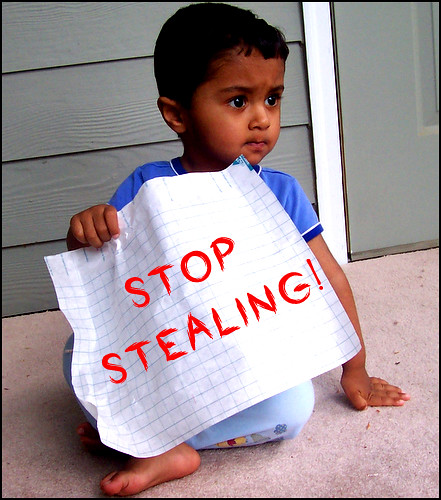The Enforcement of Intellectual Property Rights Act of 2008 (S.3325) passed the Senate and the House last week. I was hoping the economic situation might have caused enough of a distraction for this bill to fall by the wayside. No such luck.
This is the first post in a series here on Ip's What's Up that will be taking a closer look at the new Pro-Ip bill, breaking it down into simpler parts and analyzing a bit of the changes. If you would like a more detailed review of the law, Jennifer L. Elgin and Matthew J. Astle of Wiley Rein LLP have done a very thorough report of the bill at The Metropolitan Corporate Counsel.
Give it to the Gov.
Section 206 of the new Act is entitled "Forfeiture, Destruction, and Restitution." It amends Title 18 of the US Code (Crimes and Criminal Procedure) by adding a new section in Chapter 113 (Stolen Property). This new section, 18 U.S.C. 2323 is called, you guessed it, "Forfeiture, Destruction, and Restitution." In many ways, it matches similar forfeiture laws for drug related offenses. But Sec. 2323 has something special - Civil Forfeiture:
"The following is subject to forfeiture to the United States Government:
(A) Any article, the making or trafficking of which is, prohibited under section 506 of title 17 . . .
(B) Any property used, or intended to be used ...(for doing what's in part A)...
(C) Any property constituting or derived from any proceeds obtained directly or indirectly as a result of ... (doing what's in part A) ..." (italics added)
The above mentioned Section 506 is the Criminal Offenses section of the Copyright Act. It covers three different types of willful infringement:
- bootleg pre-releases via computer of works intended for the commercial market (Sec. 506(a)(1)(C)),
- infringement for "commercial advantage or personal financial gain" (Sec. 506(a)(1)(A)), and
- internet file-sharing [with some stipulations - the combined retail value of files shared in a 180-day period must be at least $1000] (Sec. 506(a)(B)).
Let's take a look at what this could mean. Ignoring, for now, the "everyday people" internet infringements, we'll focus on the infringement for financial gain.
Mr. Combs Saves the Economy
About a year ago, the Sixth Circuit heard a case involving infringement for commercial advantage, Sean Combs sampling of the Ohio Players song "Singing in the Morning" on the Notorious B.I.G. (Biggie) album Ready to Die. The court remanded the case because it found the $3.5 million in punitive damages excessive. (Bridgeport Music, Inc. v. Justin Combs Publ'g, 507 F.3d 470.)
But what does the $3.5 million matter? Under the upcoming 18 U.S.C. 2323, any money made directly or indirectly from Ready to Die, any equipment used to make the infringing track, and anything Bad Boy Entertainment or Universal Records (part of the defendant-group) has that came from proceeds directly or indirectly created by Ready to Die is subject to forfeiture to the United States Government.
Sean Combs' success as a producer, rapper, entertainment mogul and everything else he does can be traced to his work on Biggie's albums. Ready to Die itself fueled Bad Boy Entertainment's rise to the top; the album was it's first multi-platinum seller.
So, Mr. Combs, your Sean John clothing line, your East Hampton home, your share in Ciroc vodka and your nearly $350 million net-worth are all directly or indirectly related to your infringement for commercial advantage of "Singing in the Morning." Fork it over. The government does have a plan to fix the deficit and the financial crisis! Look out Dr. Dre.
Ok,ok - that's a bit extreme, but you can see why this new provision worries me a little bit. Forfeiture for crimes like drug trafficking, that actually make a few wealthy at the expense of the entire community, make some sense. After all, the government has to pay to maintain the community. But, I fail to see the causal connection that allows a private right of action to allow forfeiture to the government. What's next? If the cops recover my car from a joy-rider, do they get to keep it?
 Ignorance: On the other extreme there's the ignorance plea, the kind used to excuse a child for stealing a candy bar from the supermarket. "He didn't know any better; I'll pay for it," and all is well again. With the high-profile lawsuits like
Ignorance: On the other extreme there's the ignorance plea, the kind used to excuse a child for stealing a candy bar from the supermarket. "He didn't know any better; I'll pay for it," and all is well again. With the high-profile lawsuits like 
